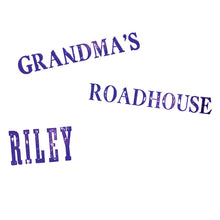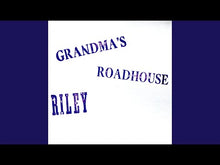Riley - Grandma's Roadhouse LP (Delmore Recording Society, 2010)
"In 1970, Gary Stewart, future King Of The Honky-Tonks, was five years from his first #1 record, She's Acting Single, I'm Drinking Doubles, and living in a beat-up trailer near Franklin, TN. Gary and Bill Eldridge, were getting their songs cut by Stonewall Jackson, Hank Snow, Cal Smith, etc. and Gary was recording unsuccessful singles. The wild abandon of Gary's stratospheric tenor co-mingling with Riley's sandpaper vocals, spot on group harmonies, psychedelic guitars mixing with southern slide, melodic bass lines, and driving drums, formed a hazy sort of perfection. Further details about the late-night sessions remain as elusive as the album itself, but what is certain, is that a sound emerged that was not yet in Nashville and Nashville didn't want it. Trickles of 'country-rock' were seeping out of various corners of the US, but what these fools had stumbled across was pure 'headneck' genius. In 1971, Riley pressed up 500 copies to sell at gigs back in Michigan until a 'real' record deal came through. But within a year, the band splintered, with Riley and the two Jim's going their separate ways and Gary going on to gigs with Nat Stuckey and then Charlie Pride, before his breakthrough.
The early ‘70s was a good time -- perhaps even the best time -- to be a country-rock band. Hippie culture had been more fully absorbed into America's collective consciousness than it was in the ‘60s, and at the same time, the backlash against the trippy, psychedelic excesses of the earlier era had begun in earnest, with the ascent of groups like the Band and Poco. For some reason, though, top-shelf country-rockers Riley never made any commercial headway. Their 1970 album, Grandma's Roadhouse, was the rarest of rarities until its reissue 40 years after the fact; the original LP was released in a limited edition of only 500. Riley, named for frontman Riley Watkins, was essentially a trio, but singer/guitarist/pianist Gary Stewart was an unofficial fourth member. Stewart, who would become a country star in his own right later in the decade, was writing songs in Nashville and working at Owen Bradley's legendary studio Bradley's Barn when he invited Riley to do some recording. Stewart became a crucial part of the sessions, singing (mostly harmony), playing guitar and piano, and contributing four songs with his Nashville writing partner Bill Eldridge (who added some guitar to the tracks as well). Grandma's Roadhouse is a raw-sounding, rough-and-ready affair with no production frills whatsoever. Even the relatively bare-bones contemporaneous work of the band's aforementioned peers sounds slick in comparison to the tough, gritty tones achieved here. Watkins' gritty, somewhat John Fogerty-ish voice is the perfect vehicle for his and Stewart's greasy, mud-soaked tunes, which combine country twang, rock & roll energy, and some Southern soul influences. There's a loose, freewheeling vibe to the record, but the tunes are all tightly constructed, and the arrangements are strictly low-fat. The closest thing to hippie-era excess is the Allman Brothers Band-esque Watkins/Stewart guitar duel on closing track "Gotta Get Away." Even if it had gotten wider distribution at the time, Grandma's Roadhouse probably would have been too rough-edged for the mainstream, but it stands as a solid example of what was going on in the early-‘70s roots rock underground. (AllMusic)
The music of country-rock pioneers such as Gram Parsons and The Byrds remains well-known today, but the end of the '60s saw country and rock struggling to comprehend each other in fascinating ways that have remained obscure. Seen through the lens of modern country's obsession with rock, the music of that long-ago era can seem either populist or humanist, but rarely both.
It would be difficult to make up a country-rock hybrid more accomplished, evocative or unlikely than Riley's 1971 Grandma's Roadhouse, which was barely released at the time, and now sees a long-overdue reissue. Recorded at Owen Bradley's famed Mt. Juliet studio and bearing the name of its unknown leader along with major contributions from country-rock avatar Gary Stewart, Grandma's Roadhouse is both human-scaled and heroic. And it likely would have remained unknown were it not for the efforts of Nashville record-label owner Mark Linn, whose previous efforts include tracking down demos by Kris Kristofferson and long-buried recordings by folk singer Karen Dalton.
Long an admirer of Stewart recordings such as 1977's Your Place or Mine, Linn wanted to put together a collection of demos by the Kentucky-born honky-tonk singer and songwriter, who died in 2003. Traveling to Stewart's Fort Pierce, Fla., home in search of material, Linn came upon Grandma's Roadhouse on a demo reel.
"I went down to see Gary's family, and there is a good friend of his [Tommy Schwartz] who's kind of the keeper of his stuff," Linn says. "I stumbled on a couple of songs that are on Grandma's Roadhouse, but nobody mentioned it. The record itself came off of a publishing demo reel that I did get from Schwartz. There's no master tapes — we haven't been able to find them."
Linn did find the remaining members of Riley, including Riley Watkins himself. A native of Burlington, N.C., Watkins moved to Michigan in the '40s, where he became enamored of rock 'n' roll and R&B. Putting together a band of his own, Watkins picked up guitar and developed into a powerful rock 'n' roll singer. In the early '60s he briefly landed in Fort Pierce, where he met Stewart. Already an aspiring performer, Stewart joined Watkins' group.
"When Gary was with us, we didn't back up anybody," Watkins says from his current home in Tuscumbia, Ala. "But before Gary, we backed up Roy Orbison, Jerry Lee Lewis, Del Shannon and Ray Stevens. This was in the Northeast, and they were club dates."
Riley played Michigan clubs and listened hard to '60s rock and soul music. At the same time, Stewart moved to Nashville to write songs with a Fort Pierce friend named Bill Eldridge. They had some limited success, and the partnership also yielded some fine rockabilly-flavored tunes that Stewart recorded for the Kapp label in the late '60s.
Publishing contract in hand, Stewart and Eldridge began working as engineer's assistants at Bradley's Barn in Mt. Juliet. Sometime in 1969, Stewart suggested that Watkins bring his trio to Tennessee and do some recording. Done during off hours at the studio, these sessions would result in Grandma's Roadhouse.
Stewart and Eldridge contributed four songs to Roadhouse, including the title track, which is prototypical Southern rock powered by bassist Jim Noveskey and drummer Jim Snead. Meanwhile, Watkins' "You Been Cheatin' on Me Honey" suggests a fusion of country and Tony Joe White's psychedelic swamp-funk. The overall effect recalls the nuanced yet balls-out sound of Moby Grape on 20 Granite Creek, or a looser version of Creedence Clearwater Revival.
Elsewhere, Stewart's vocals split the difference between country and rock on "Drinkin' Them Squeezins." The songs and performances are simple and effective, with unearthly harmonies adding a note of late-'60s languor to Watkins' hymn to marijuana, "Field of Green." The record is quite commercial, and deserved better than the 500 copies the band pressed at their own expense in early 1971.
Stewart would go on to perfect his own country-rock synthesis on classic '70s recordings like "Drinkin' Thing" and "Single Again." But his combination of Jerry Lee Lewis vocals and Allman Brothers-influenced guitars would prove difficult to market. Watkins continued to put together bands and write songs, and played in Stewart's band in the early '80s.
In the end, the miraculously artless approach Riley perfected on Grandma's Roadhouse would be forgotten. Such is the fate of populist humanism, perhaps. Or maybe it's symptomatic of something about the country audience itself. As Bill Eldridge says of Stewart, "Country folks, when they like you doin' one thing, they don't want you to change. Gary didn't care about being a star. He wanted to do what he wanted to do. Didn't matter what they wanted."" - Edd Hurt (Nashville Scene)



